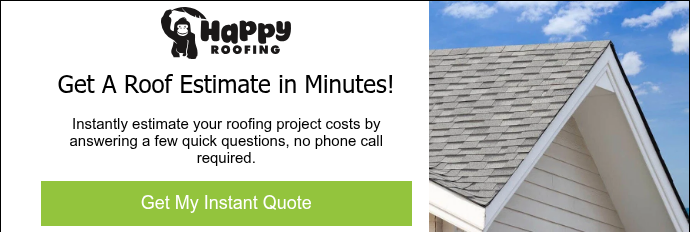What Should You Do After a Roof Inspection?

So you've had your roof inspected—now what?
For some homeowners, the inspection feels like the biggest hurdle when planning a roof project, but what happens after the inspection is just as important as the inspection itself. This is where decisions need to be made, and with an investment like a roof replacement, you shouldn't have to weigh your options with any confusion.
At Happy Roofing, we've worked with countless homeowners who've walked away from an inspection holding a report, photos, or even a quote, but no real guidance on what to do next.
That uncertainty leads to stalled projects, missed repairs, and sometimes serious damage down the road. That's why we want to walk you through the most important post-inspection steps to take to ensure you're making the best possible choice for your home.
In this article, you'll learn:
- How to understand the results of your inspection
- How to compare quotes fairly and avoid hidden costs
- What questions you should ask before making any decision
By the end, you'll be able to make sense out of all those inspection reports.
Table of Contents
- Understanding Your Roof Inspection Report
- How to Use Inspection Report Findings to Help You Make a Decision
- Key Factors to Consider Before You Make Your Roofing Decision
- Scheduling Your Roof Inspection
How Do You Interpret a Roof Inspection Report?
No two roof inspection reports look exactly the same, but the best way to make sense of yours is to carefully review the documentation, study the photos, and ask questions until you have a clear picture of your roof’s condition.
Every contractor has their own system when they create inspection reports, but there are a few key components you can look for to help you interpret what yours is really saying. Don't settle for "inspections" that end in your contractor telling you that you need a new roof, when they haven't even stepped on top of your roof.
After an inspection, you should know exactly what was inspected, what the findings mean, and why they matter. Unfortunately, many reports are filled with jargon and vague notes that don't give you a clear picture of your roof's condition.
Key Components of the Report You Should Review
- What was inspected: Your report should outline each area that was reviewed, including the roof surface, shingles, flashing, attic, ventilation, gutters, and roof deck. This ensures nothing is overlooked and gives you a complete picture of your roof's health.
- What the findings mean: Beyond simply listing problems, your report or contractor should explain the severity and urgency of each item. A small cosmetic issue may be something to monitor, while multiple missing shingles or warped decking could require immediate attention.
- Visual documentation: Strong reports don't just rely on words. They include photos, videos, and other documentation that help you understand what your contractor is seeing. This makes it easy to connect the findings with why they matter, so you're not left wondering if you're being upsold materials or if the recommendation is something you truly need.
Below is an example of one of the photos we provide after our inspections. We do this to better help homeowners understand the health of their roof, and why we're making the recommendations that we're making:

What Questions to Ask Based on What You See
If your inspection report is unclear or you don't understand some parts, don't hesitate to ask your contractor for more clarity.
Here are a few questions that help gain a better understanding of what your inspection report means for your home:
- How urgent is this issue?
- What will happen if I delay repairs/maintenance?
- If I make only the most urgent repairs now, how long can I reasonably expect my roof to last?
How to Use the Inspection Findings to Make a Decision
When you have a thorough understanding of your inspection report, you should have enough information to decide on your next steps. You can use this documentation to help you compare options and what level of detail other contractors are offering.
Should You Get a Second Opinion?
If you're unsure about the recommendations or the price, it's perfectly reasonable to get a second opinion.
Roofing is a significant investment, and another set of eyes can confirm the severity of an issue or provide alternative solutions. Just make sure you're comparing apples to apples: similar scopes of work, materials, and warranty coverage.
A low quote may look appealing, but it could leave out critical details like replacing rotten decking, correcting poor ventilation, or hauling away debris. Skipping these items might lower the upfront price, but it often leads to higher costs and headaches later.
When reviewing multiple quotes, here are key things to look for:- Scope of work: Does each proposal clearly list the same steps, such as tear-off, underlayment, flashing replacement, and cleanup? Some quotes may leave out necessary work that could affect the lifespan of your new roof.
- Materials: Are you comparing the same shingle type, ventilation products, and underlayment quality? Lower quotes could be using cheaper materials. While this isn't always a problem, you should know what will be going on your home. It's important to have an idea of material performance and limitations.
- Warranties: Do they include both manufacturer and workmanship coverage—and are they explained clearly? Understanding the terms of your warranty and what's covered can help you choose a contractor. Two similar quotes can offer different warranty coverage, as this typically relies on the contractor and materials used.
- Timeline: How long will the project take, and when can it start? In emergencies, or if you're on a strict timeline, this can be an important question to have the answer to before you commit to any work. It's important to find a contractor who can accommodate your schedule.
- Variable costs: How do they handle hidden issues? Will the price change after you start working? Some factors, like roof decking condition, can't be fully verified until the project begins. A good contractor will be upfront about what could change, and by how much. We include a line item stating the per-sheet cost of the decking material, so homeowners have an idea of what to expect if we find damaged decking after the roof tear-off.
By looking beyond the price tag, you can spot the real differences between contractors and make a choice that balances cost, quality, and long-term protection.
How to Make the Right Decision for Your Roof: Additional Factors to Consider
When choosing a roofing contractor, the goal is to make an informed decision that aligns with your goals and balances cost, quality, and durability.
Here's how to get the most value from your choice:
- Ask About Long-Term Value: Price matters, but durability and performance matter more if you plan on staying in your home long-term. Ask your roofer if any of their recommendations include an option that prioritizes the lifespan of your roof.
- Look for Post-Installation Support: A roof is a long-term investment, and you should be supported even after the project is completed. Ask your contractor what's included in your warranties, how to register, and who to contact if an issue comes up years down the line.
Scheduling A Roof Inspection
With any roofing project, clarity at the inspection and quoting stage is critical. Misunderstandings here can lead to missed repairs, hidden costs, or even poor workmanship that shortens your roof's lifespan.
That's why a proper roof inspection should document everything with photos and measurements, explain findings in plain language, and outline clear recommendations so you can compare options, plan your budget, and make confident decisions.
Whether you're planning ahead, comparing bids, or just want peace of mind, you can schedule an inspection with us. Our 29-point inspection is designed to give you a complete picture of your roof's condition. We'll work around your schedule, walk you through our findings, and answer any questions you may have, without pushing you to move forward.
If you'd like a rough estimate before talking to a roofing professional, our instant roof estimator tool gives you a ballpark price based on your home's details. It's a quick, no-pressure way to understand potential costs and start planning with realistic numbers.
The Author: Pedro Toledano
Happy Roofing is a trusted roofing company dedicated to providing top-quality roofing services to residential and commercial clients. With years of experience, they specialize in roof installations, repairs, and maintenance, ensuring durability and customer satisfaction. The team is known for their professional approach, timely service, and attention to detail. Happy Roofing prides itself on using high-quality materials and offering competitive pricing. Follow their Facebook page for updates on projects, customer testimonials, and tips on maintaining your roof in excellent condition.





